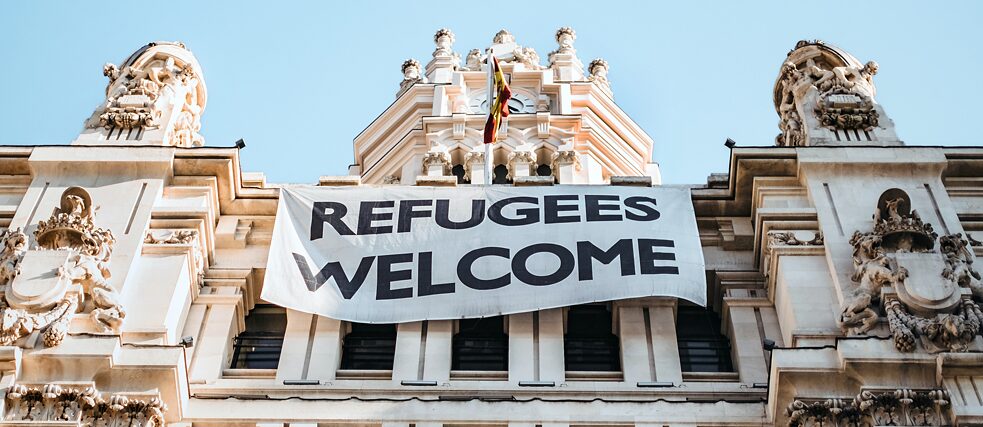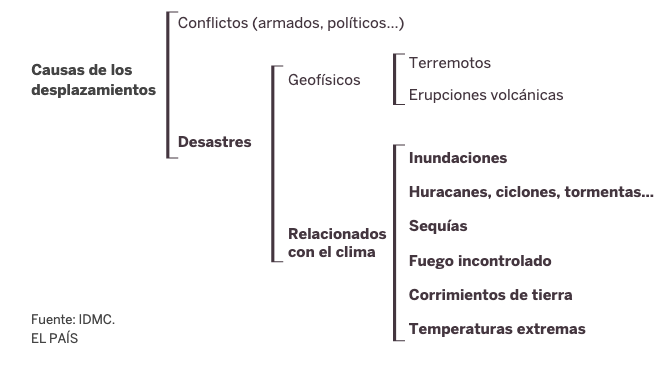CLIMATE REFUGEES
the climate crisis is a social crisis

Banner on the façade of Madrid City Hall with the inscription "Refugees Welcome". | © Unsplash
Some 20 million people are forced to flee their homes every year because of climate change. Yet their legal entitlement to help is minimal. This is a social crisis that affects particularly those people who contribute least to the causes of climate change.
By Carmen Huidobro and Belén Hinojar
1. The great unknowns
Climate refugees, environmentally displaced persons or "climate migrants" are cited as one of the most dramatic, if not the most visible, consequences of a climate crisis that has already occurred. As activists, we should know about this and be aware that the climate crisis is ultimately a social crisis.Climate refugees are people who are forced to migrate due to environmental changes brought about by climate change. Examples include floods, droughts , desertification, etc. According to the International Organisation for Migration (IOM) more than 98% of the 30.7 million recorded cases of emigration in 2020 were due to environmental factors. UNHCR figures show that some 20 million people are forced to emigrate every year on average for these reasons. The chart below, published by the daily El País, sets out the different concepts of and reasons for emigration.
 Source: https://elpais.com/sociedad/2019/12/03/actualidad/1575399365_095982.html
| © IDMC
Source: https://elpais.com/sociedad/2019/12/03/actualidad/1575399365_095982.html
| © IDMC
2. Lack of protection at global level
We spoke with Francisco Rojo of Accem, a Spanish NGO that supports refugees and people in other vulnerable situations. The Global Pact for Safe, Orderly and Regular Migration (prepared under the auspices of the UN General Assembly) recognises the existence of "migratory movements" caused by natural disasters and the negative effects of climate change, and calls on the signatories to minimise the structural factors of such migratory movements. It does not grant legal status to migrants however, but seeks only to minimise the factors that force people to leave their countries of origin for these reasons.3. How activism can help
Francisco says that "we at Accem have not yet come across people who have justified their application for protection with forced displacement on climate grounds. But there is no denying that people sometimes leave their home countries in search of a better life. Although they do not say so directly, they may have had to leave their country of origin because climate change had a direct impact on their living conditions, which in turn prevented them from finding a job there, which in turn forced them to emigrate.This situation is currently a great injustice, as the populations most affected are the very same that have contributed the least to global emissions. According to an Oxfam study, people in Somalia and India, for example, are four times more likely to have to flee because of the climate than people in high-income countries such as Spain and the USA.
It is nonetheless certain that the number of people who have to leave their homes due to the consequences of climate change will continue to rise. It is up to us to bring pressure to bear on governments to take action and provide legal protection to these people, support organisations that work for this cause (by making it more visible or dedicating our time to that end or providing financial support, etc.), and to raise awareness about how extensively climate change affects people and will affect them in the future.
This is what the Pass-The-Mic movement is all about, as our colleague Lola from Belgium reports in the last article of this season: to give a voice and visibility to those people who go largely unheeded, such as the Most Affected People and Areas(MAPA) as they are known.
Did you like this article? Please share your opinion with us on the social media. Till next time!